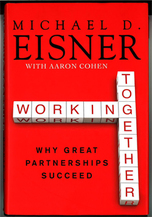 I recently completed Michael Eisner's new book on successful partnerships called Working Together. I was very motivated to read the book because I have had both good and bad teamwork/partnership experiences in the past, and I was curious to hear about how 11 of the world's most famous partnerships worked. I understand that all people and partnerships are different, and all of the lessons may not apply to everyone directly. However, I wanted to understand as closely as possible the things that made others' partnerships work and not work so that I too can be an effective partner and can identify potential effective partnerships to be a part of in the future. (I will confess that I "read" this work as an audiobook and was not able to take great notes on it. Most of the information below is from the best of my memory, and where it's sparse, it's all my fault; the actual text has a lot of great stories and details that left an impression on me but which I can't perfectly recall.)
I enjoyed the book greatly, both from the perspective of partnership and also from the perspective of entrepreneurship. It was fascinating to hear the stories of such a diversity of businesses being started up, and similarly, such a diversity of people working together. I realized the key in all of these partnerships were the following commonalities:
The combination of matching and non-matching elements, when present in an environment of trust and respect, can lead to some pretty remarkable results. Eisner concluded the book with some thoughts on why to even be in partnership and how to set them up. He said that in the end, what makes life truly worth living is sharing experiences with other people. This is the core reason at the end of the day to have partners. He says that if partnerships have failed for you in the past, the problem is not with partnership in general, and so you should keep trying new partnerships until you find some that work. I personally think that for some people or in some situations, full equal partnerships might not be the best. But no matter what the actual situation, treating your peers as partners with full respect, trust, and support always does. In addition, he cautions against using pre-nuptial agreements or buy-sell agreements in businesses (contracts that aim to plan for the partnership dissolving). He says they are unproductive and cause more hurt than good. He preaches that people should work things out, and if they can't, to part ways. I personally think this is a valiant notion, but often times the complexities and logistics with figuring out how to part ways once there is trouble can be much worse than planning for it when times are good. I really think it depends on the type of personalities of the partners; if they are both level-headed, rational, and can think about the issues at arm's length in the beginning when setting up a fair agreement, it will not do much harm and can prevent problems down the line.
0 Comments
Your comment will be posted after it is approved.
Leave a Reply. |
Archives
June 2024
Categories
All
Subscribe |
 RSS Feed
RSS Feed
